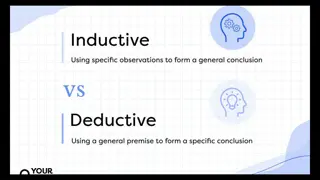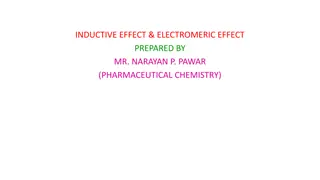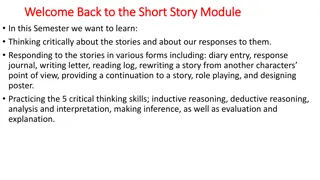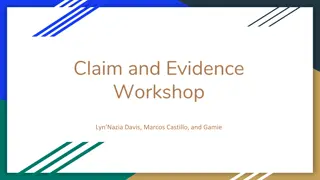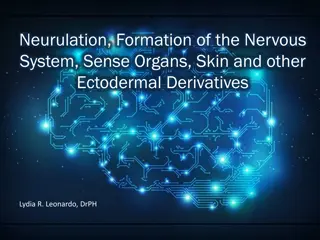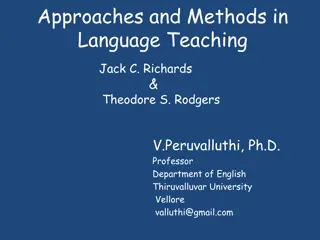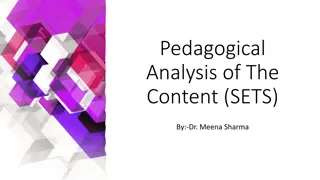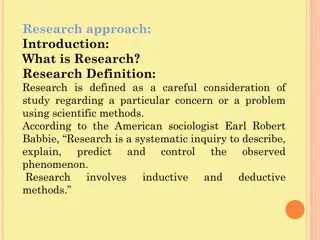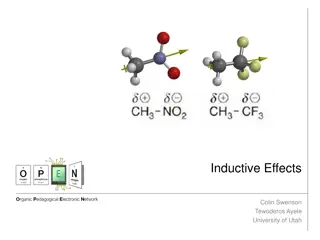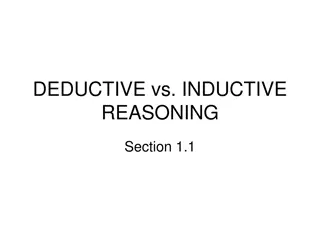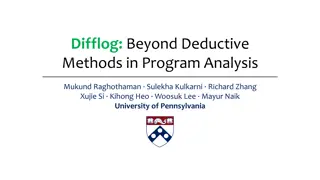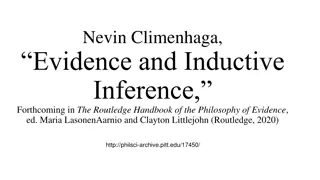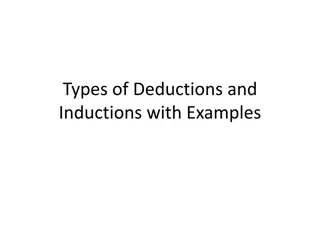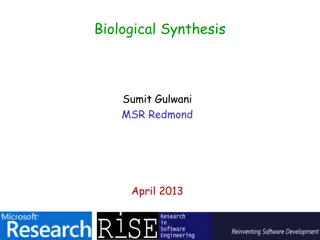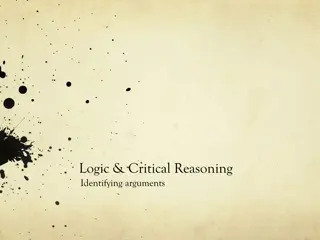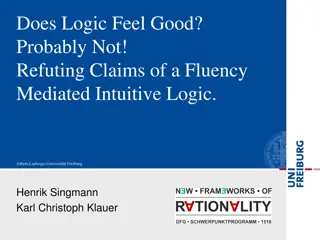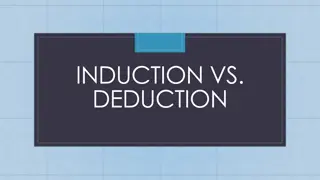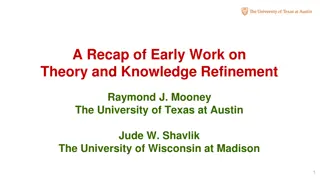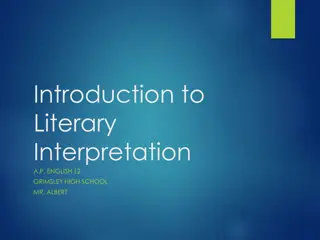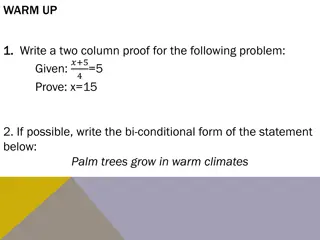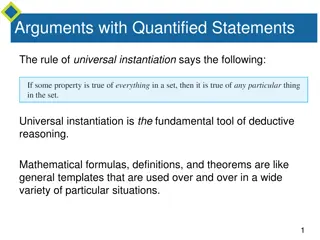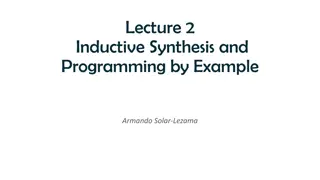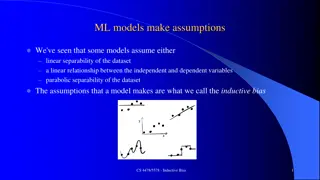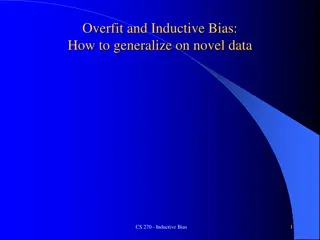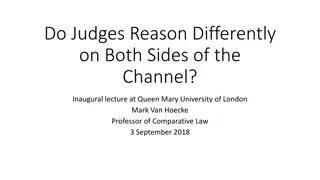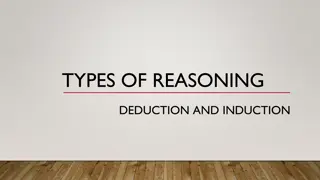Inductive and Deductive Reasoning
Inductive reasoning involves drawing general conclusions from specific observations, while deductive reasoning starts with general premises to derive specific conclusions. Induction uses experience or experimental evidence to make broad conclusions, while deduction follows from general to specific.
5 views • 7 slides
The Inductive and Electromeric Effects in Organic Chemistry
The inductive effect in organic chemistry is the polarization of a bond due to electron-donating or withdrawing effects of adjacent groups, leading to a degree of polarity in the bond. This effect is distance-dependent and can be either electron-withdrawing or electron-releasing. On the other hand,
0 views • 12 slides
Engaging with Critical Thinking in Short Stories
Explore different ways of responding to short stories, from diary entries to role-playing, while honing critical thinking skills like deductive and inductive reasoning. Delve into character analysis, themes, and personal reflections to enhance understanding and engagement with the author's work.
2 views • 32 slides
Mastering the Toulmin Method for Constructing Persuasive Arguments
Learn how to effectively structure arguments using the Toulmin Method, which consists of Claim, Data, Warrant, Backing, Counterclaim, and Rebuttal elements. Explore reasoning and logic concepts, differentiate between inductive and deductive reasoning, and understand how to construct valid arguments
0 views • 30 slides
Embryonic Development: Key Processes and Organization
Embryonic development involves neurulation, organogenesis, and morphogenetic processes that shape the nervous system, sense organs, skin, and other ectodermal derivatives. The embryo undergoes allocation and differentiation processes, influenced by epigenetic events and the action of organizers. Emb
2 views • 25 slides
Institutionalism and Methodological Issues in Political Science
Institutionalism is a foundational concept in political science, emphasizing the study of governing institutions and their role in shaping political behavior. It explores inductive and deductive approaches to research, highlighting the significance of empirical evidence and theoretical assumptions.
0 views • 19 slides
Evolution of Language Teaching Methods: From Grammar Translation to Direct Method
Explore the historical development of language teaching methods, starting from the traditional Grammar Translation Method to the innovative Direct Method alongside key figures and principles. The transition from text-focused, deductive grammar teaching to conversational, inductive approaches marks a
2 views • 89 slides
Pedagogical Analysis of Sets in Mathematics: Key Concepts and Teaching Strategies
Explore the pedagogical analysis of SETS by Dr. Meena Sharma, focusing on major concepts like the meaning of SET, SET notation, classification of SETS, and fundamental operations. Understand minor topics such as examples of sets, SET notation methods, and types of SETS. Objectives include defining S
0 views • 8 slides
The Fundamentals of Research: A Comprehensive Overview
Research is a systematic inquiry aimed at understanding, describing, explaining, and predicting phenomena using scientific methods. It involves both inductive and deductive approaches, with a focus on logical reasoning and real-time data collection. Key characteristics include a systematic approach,
5 views • 11 slides
Inductive Effects in Organic Chemistry
Inductive effects play a crucial role in the reactivity and properties of organic molecules. This phenomenon involves the withdrawal or donation of electron density due to differences in electronegativity, impacting acidity, stability, and interactions with other molecules. Explore how inductive eff
0 views • 7 slides
Deductive Reasoning and Problem Solving in Logic
Explore the concepts of deductive reasoning, problem-solving logic, and Venn diagrams in this informative content. Learn about the process of drawing conclusions from known facts, using syllogisms to make valid arguments, and understanding the difference between truth and validity in deductive reaso
7 views • 16 slides
Advancements in Program Analysis Beyond Deductive Methods
Explore the evolution of program analysis beyond deductive methods with innovative tools like static analyzers and data-driven analysis design. Discover the challenges faced, such as undecidable analysis questions and scalability issues, and the strategies employed to address them. Learn about the s
0 views • 24 slides
Inductive Inferences and Their Relation to Probability
Nevin Climenhaga delves into the world of inductive inferences, categorizing them into downward, upward, and sideways forms. He discusses connections with probability, confirmation, epistemic defeat, and more, emphasizing the distinction between direct and indirect forms of inferences.
0 views • 15 slides
Deductive and Inductive Reasoning
Explore the world of deductive and inductive arguments through examples of deductive reasoning based on definitions and math, including categorical syllogisms, hypothetical syllogisms, and disjunctive syllogisms. Delve into inductive reasoning and the key distinctions between deductive and inductive
0 views • 26 slides
Infinite Lottery Machines: An Inductive Approach
An in-depth exploration of the Material Theory of Induction applied to infinite lottery machines, discussing the challenges and strategies for making inductive inferences in such scenarios. The analysis covers probabilistic considerations, countable additivity issues, equal probability of outcomes,
0 views • 22 slides
Insights into Biological Synthesis Techniques and Related Work
Explore the biological synthesis project by Sumay and Sumit Gulwani at MSR Redmond. The project delves into template-based approaches and safety considerations in artifact synthesis. The outline covers inductive synthesis, challenges, and successes in achieving synthesis goals. Discover unique namin
0 views • 15 slides
Logic and Critical Reasoning: Identifying Arguments
In the study of logic and critical reasoning, identifying arguments is a fundamental task. Arguments consist of premises supporting a conclusion, and they can be identified by specific indicators and techniques. Understanding argument structure and types of support, such as deductive and inductive,
2 views • 15 slides
Deductive Reasoning and Intuitive Logic
Deductive reasoning involves assessing the validity of arguments based on premises, while fluency-mediated intuitive logic suggests people have an intuitive sense of logicality. Challenges arise in drawing correct conclusions from abstract syllogisms, indicating a need for deliberate and effortful p
0 views • 24 slides
Deductive and Inductive Reasoning in Problem-Solving
Explore the differences between deduction and induction in problem-solving approaches. Deductive reasoning starts with a general statement and moves to specifics, offering certainty and objectivity, while inductive reasoning begins with specifics and arrives at a generalization, providing flexibilit
0 views • 11 slides
Evolution of Theory and Knowledge Refinement in Machine Learning
Early work in the 1990s focused on combining machine learning and knowledge engineering to refine theories and enhance learning from limited data. Techniques included using human-engineered knowledge in rule bases, symbolic theory refinement, and probabilistic methods. Various rule refinement method
0 views • 12 slides
Framework for Ontology Learning from Big Data with IDRA
IDRA (Inductive Deductive Reasoning Architecture) presents a comprehensive framework for ontology learning, focusing on data modeling and architecture components. ETL (Extract Transform Load) processes play a vital role in semantic enhancement of data, especially in identity and access governance co
0 views • 25 slides
Analyzing Texts Using Inductive Reasoning in Literary Interpretation
Utilizing inductive reasoning in literary interpretation involves examining specific details within a text to develop a debatable thesis statement supported by trends, patterns, and connections found in the material. This analytical approach requires a methodical breakdown of a writer's techniques t
0 views • 12 slides
Logic in Mathematics and Deductive Reasoning
Delve into the principles of logical deduction in mathematics through examples of conditional statements, syllogisms, and proofs. Explore how deductive reasoning can lead to valid conclusions based on given premises.
0 views • 12 slides
Enhancing Simulation Learning Through Effective Debriefing Practices
Debriefing in simulation-based education plays a crucial role in improving learning outcomes and psychological safety. This approach focuses on perceptions, experiences, and expectations, utilizing a combination of deductive and inductive methods. Key findings suggest that faculty support and a supp
0 views • 18 slides
Economic Models: Assumptions, Deductive Reasoning, and Logical Fallacies
Economic models utilize deductive reasoning to simplify real-world economic relationships. Assumptions vs. implications are key components, where assumptions reflect reality or are simplifying. This process helps identify conditions for specific outcomes to occur and distinguishes between consequent
2 views • 17 slides
Scientific Method and Objective Approach
Explore the steps of the scientific method, importance of objectivity, and key concepts like hypothesis, null hypothesis, accuracy, precision, and sample size. Distinguish between inductive and deductive reasoning, as well as theory versus natural law in scientific research.
0 views • 12 slides
Effective Sermon Structure for Impactful Delivery
Discover the essential elements of structuring a sermon effectively, drawing parallels between buildings and sermons. Learn key components such as coordinating points, focus on recipients, and proper tense usage. Explore different sermon structures, inductive-deductive approaches, and the importance
0 views • 25 slides
Universal Instantiation in Deductive Reasoning
Universal instantiation is a crucial tool in deductive reasoning, allowing us to derive specific conclusions from general statements. By combining universal instantiation with modus ponens and modus tollens, we can construct valid arguments such as universal modus ponens and universal modus tollens.
0 views • 13 slides
Programming by Example: A Journey into Inductive Synthesis
Delve into the realm of Programming by Example (PBE) and its motivating factors, distinctions from Programming by Demonstration (PBD), history of inductive learning, and the significance of generalization from observations. Explore how PBE and PBD fit into the landscape of inductive learning and mac
0 views • 32 slides
Enhancing Reader Comprehension in Audit Report Writing
Tools for improving reader comprehension in audit report writing, including deductive writing, economy of words, and descriptive headings. Learn the difference between inductive and deductive writing and how to make audit reports more engaging and informative. Practical examples provided.
0 views • 43 slides
Reasoning as a Method of Knowledge Acquisition
Reasoning serves as a fundamental way of knowing, enabling individuals to transcend immediate experiences, build knowledge, and evaluate beliefs. This process involves the application of logic, examining the interplay between beliefs, ideas, and truth. By integrating reason with imagination, individ
0 views • 37 slides
Inductive Bias in Machine Learning
Machine learning models rely on inductive bias, which are the assumptions made by algorithms to generalize from training data to unseen instances. Occam's Razor is a common example of inductive bias, favoring simpler hypotheses over complex ones. This bias helps algorithms make predictions and handl
0 views • 20 slides
Overfitting and Inductive Bias in Machine Learning
Overfitting can hinder generalization on novel data, necessitating the consideration of inductive bias. Linear regression struggles with non-linear tasks, highlighting the need for non-linear surfaces or feature pre-processing. Techniques like regularization in linear regression help maintain model
0 views • 37 slides
Contrasting Legal Reasoning in Common Law and Continental Law Systems
This inaugural lecture explores the differences in legal reasoning between judges on both sides of the English Channel. It delves into the declaratory theory of decision-making in Common Law and the application of legislative intent in Continental Law. The lecture also touches on the contrasting ind
0 views • 48 slides
TYPES OF REASONING DEDUCTION AND INDUCTION
Reasoning involves a connected sequence of thoughts leading to a conclusion. Deductive reasoning moves from general to specific, identifying assumptions and hidden premises. Categorical syllogisms demonstrate valid and sound argument structures, while real-life arguments may require uncovering assum
0 views • 21 slides
Inductive Power Transfer System Market
The global inductive power transfer system (IPT) market is evaluated $27.5 billion in 2024, is projected to expand at a CAGR of 26.1%, to reach $280.5 billion by 2034.\n\nRead Report Overview: \/\/bisresearch.com\/industry-report\/inductive-power-tra
2 views • 3 slides
2-4 Deductive Reasoning
Deductive reasoning entails drawing logical conclusions from given statements or facts. This involves applying the Law of Detachment and Law of Syllogism to deduce new information based on established truths. Through examples and visuals, explore how these principles guide reasoning processes and le
0 views • 10 slides
Logic and Legal Reasoning
Inductive reasoning plays a crucial role in legal decision-making, especially in appellate cases. This article explores the concepts of inductive generalization and analogy in the context of legal reasoning. Examples and real-world cases demonstrate how legal principles are applied and generalized t
0 views • 14 slides
Computational Chemogenomics: Inductive Transfer vs. In Silico Drug Discovery
This article by J.B. Brown et al. explores the relationship between computational chemogenomics and inductive transfer in drug discovery. The authors discuss the nuances of leveraging data-driven approaches and machine learning in predicting molecular interactions and drug-protein interactions, high
0 views • 18 slides
Analyzing Inductive Arguments & Fallacies
Inductive arguments present conclusions based on likelihood, which can be strong, weak, or in-between. Learn about fallacies in reasoning, both formal and informal, and ways to spot and address them effectively.
0 views • 17 slides
